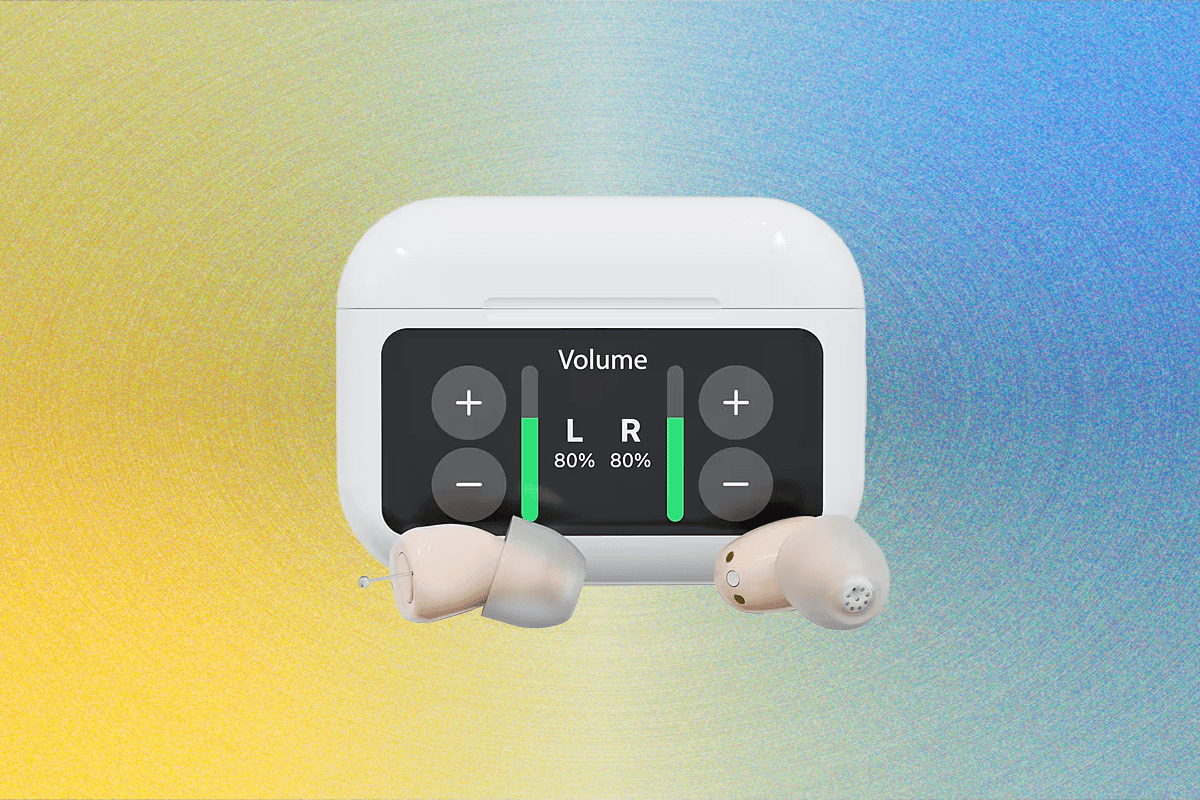Audien Hearing made waves last year when it launched the Atom One, one of the few hearing aids to hit the market for under $100. The only problem is one you probably figured out already: They just weren’t very effective as hearing aids, providing a blunt amplification of every sound, whether you wanted to hear it or not—underpinned with a steady layer of hiss.
Audien has repeatedly tried again in this low-end part of the market, cranking out at least five models of low-cost hearing aids. While they have gently ratcheted up the price, most cost under $300. Its latest release is the Atom X, another spin on the same in-the-ear design but with some fancy new features and a $389 price, inching ever upward.
Case Study

Photograph: Chris Null
The hearing aids themselves aren’t exactly striking: Earplug-like and beige, with a weight of 2.20 grams each, the simple devices each have a fat button on the outward-facing surface. These buttons control everything from volume (independently in each ear) and streaming media to hands-free calling, depending on whether they are connected via Bluetooth and how long the button is pressed.
The oblong design looks a bit odd at first, but it turns out they are fairly comfortable for longer listening sessions and reasonably discreet, only barely visible when in place in the ear. Three sets of differently sized ear tips in two different shapes, both unvented, are included in the box.
The surprising and much bigger news involves the case, and I can safely say that the Atom X has the most advanced and useful case of any hearing aid product I’ve tested to date—more powerful than the case included with products that are 10 times the cost. The secret sauce is a touchscreen on the front, letting you easily tap to control volume, environmental mode, and toggle Bluetooth on and off.

Photograph: Chris Null
When streaming over Bluetooth, the touchscreen changes to control media volume and access to the transparency level (the amount of noise cancellation). Yet another mode kicks in when you are interacting with a phone call. The case also displays the real-time battery level for each hearing aid independently and the battery level of the case itself. Audien says you can expect 20 hours from the aids (without streaming) on a full charge and 28 additional hours of charge from the case before it needs to be topped up via a USB-C connection. Those estimates were reasonably accurate in my testing. As a bonus, the case even includes a built-in UV sterilization system.
I really enjoyed having all of this power at the ready without having to use an app, which is especially handy because Audien doesn’t have an app. Streaming functions largely work like they would on a standard set of Bluetooth earbuds, and all hearing aid settings have to be managed through the case.
Blunt Tools

Photograph: Chris Null
That lack of control has long been the problem with Audien’s products, which are blunt amplifiers that can’t be tuned outside of changing the volume and picking one of the four environmental modes. There is no hearing test function and no way to shape the frequencies where you need the most help, which means everything gets lifted, more or less. For users accustomed to more refined control, it’s a jarring experience, though Audien suggests that over time “your brain will adjust” to the overload of background sounds and your own booming voice.
The four environmental modes can be of some help here, but the best in my experience was the default Comfort mode, which “reduces the sharpness of high-frequency sounds and overall intensity, creating a more comfortable, balanced listening experience.” The Atom X’s Conversation mode was too sharp for much use, while the Crowd and TV modes didn’t make a big impact in comparison to the Comfort mode.

Photograph: Chris Null
I immediately noticed that there was a much lower level of hiss on the Atom X than on previous Audien hearing aids, but the overall experience still wasn’t all that effective. By blasting out lower frequencies I didn’t need amplified, I found I often heard worse with the hearing aids in than with them out—and this was exacerbated the louder I pushed the volume. At very low levels of amplification (10 or 20 percent at most), the hearing aids were at their most effective for me. Anything beyond that threatened to get painful.
At $389, the Atom X is a tough sell compared to the $249 Apple AirPods Pro 3, which have a tuning system, app control, outstanding noise cancellation, and overall better-quality hearing support. Yes, they are much larger and more visible than the Atom X aids, but if you never actually wear your hearing aids because they don’t provide a great experience, how much does discretion even matter?




